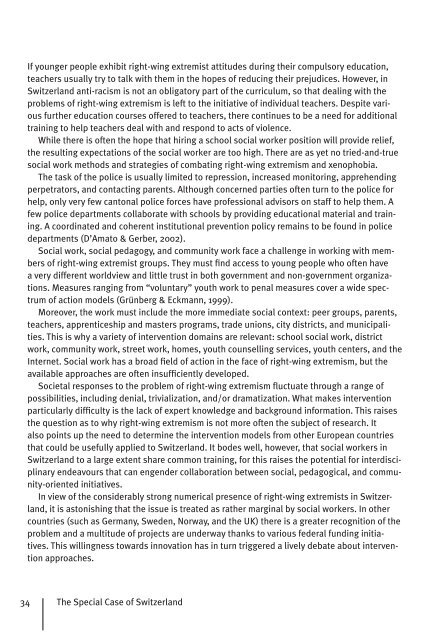Prevention of Right-Wing Extremism, Xenophobia and Racism in ...
Prevention of Right-Wing Extremism, Xenophobia and Racism in ...
Prevention of Right-Wing Extremism, Xenophobia and Racism in ...
You also want an ePaper? Increase the reach of your titles
YUMPU automatically turns print PDFs into web optimized ePapers that Google loves.
If younger people exhibit right-w<strong>in</strong>g extremist attitudes dur<strong>in</strong>g their compulsory education,<br />
teachers usually try to talk with them <strong>in</strong> the hopes <strong>of</strong> reduc<strong>in</strong>g their prejudices. However, <strong>in</strong><br />
Switzerl<strong>and</strong> anti-racism is not an obligatory part <strong>of</strong> the curriculum, so that deal<strong>in</strong>g with the<br />
problems <strong>of</strong> right-w<strong>in</strong>g extremism is left to the <strong>in</strong>itiative <strong>of</strong> <strong>in</strong>dividual teachers. Despite vari-<br />
ous further education courses <strong>of</strong>fered to teachers, there cont<strong>in</strong>ues to be a need for additional<br />
tra<strong>in</strong><strong>in</strong>g to help teachers deal with <strong>and</strong> respond to acts <strong>of</strong> violence.<br />
While there is <strong>of</strong>ten the hope that hir<strong>in</strong>g a school social worker position will provide relief,<br />
the result<strong>in</strong>g expectations <strong>of</strong> the social worker are too high. There are as yet no tried-<strong>and</strong>-true<br />
social work methods <strong>and</strong> strategies strategies <strong>of</strong> combat<strong>in</strong>g right-w<strong>in</strong>g extremism <strong>and</strong> xenophobia.<br />
The task <strong>of</strong> the police police is usually limited to repression, <strong>in</strong>creased monitor<strong>in</strong>g, apprehend<strong>in</strong>g<br />
perpetrators, <strong>and</strong> contact<strong>in</strong>g parents. Although concerned parties <strong>of</strong>ten turn to the police for<br />
help, only only very few cantonal police forces have pr<strong>of</strong>essional advisors on staff to help them. A<br />
few police departments collaborate with schools by provid<strong>in</strong>g educational material <strong>and</strong> tra<strong>in</strong>-<br />
<strong>in</strong>g. A coord<strong>in</strong>ated <strong>and</strong> coherent <strong>in</strong>stitutional prevention policy rema<strong>in</strong>s to be found <strong>in</strong> police<br />
departments (D’Amato & Gerber, 2002).<br />
Social work, social pedagogy, <strong>and</strong> community work face a challenge <strong>in</strong> work<strong>in</strong>g with mem- mem-<br />
bers <strong>of</strong> right-w<strong>in</strong>g extremist groups. They must fi nd access to young people who <strong>of</strong>ten have<br />
a very different worldview <strong>and</strong> little trust <strong>in</strong> both government <strong>and</strong> non-government organizations.<br />
Measures rang<strong>in</strong>g from “voluntary” youth work to penal measures cover a wide spec-<br />
trum <strong>of</strong> action models (Grünberg & Eckmann, 1999).<br />
Moreover, the work must <strong>in</strong>clude the more immediate social context: peer groups, parents,<br />
teachers, apprenticeship <strong>and</strong> masters programs, trade unions, city districts, <strong>and</strong> municipali-<br />
ties. This is why a variety <strong>of</strong> <strong>in</strong>tervention doma<strong>in</strong>s are relevant: school social work, district<br />
work, community work, street work, homes, youth counsell<strong>in</strong>g services, youth centers, <strong>and</strong> the<br />
Internet. Social work has a broad fi eld <strong>of</strong> action <strong>in</strong> the face <strong>of</strong> right-w<strong>in</strong>g extremism, but the<br />
available approaches are <strong>of</strong>ten <strong>in</strong>suffi ciently developed.<br />
Societal responses to the problem <strong>of</strong> right-w<strong>in</strong>g extremism fl uctuate through a range <strong>of</strong><br />
possibilities, <strong>in</strong>clud<strong>in</strong>g denial, trivialization, <strong>and</strong>/or dramatization. What makes <strong>in</strong>tervention<br />
particularly diffi culty culty is the lack <strong>of</strong> expert knowledge <strong>and</strong> background <strong>in</strong>formation. This raises<br />
the question as to why right-w<strong>in</strong>g right-w<strong>in</strong>g extremism extremism is not more <strong>of</strong>ten the subject <strong>of</strong> research. It<br />
also po<strong>in</strong>ts po<strong>in</strong>ts up the need to determ<strong>in</strong>e the <strong>in</strong>tervention models from other European countries<br />
that could be usefully applied to Switzerl<strong>and</strong>. It bodes well, however, that social workers <strong>in</strong><br />
Switzerl<strong>and</strong> to a large extent share common tra<strong>in</strong><strong>in</strong>g, for this raises the potential for <strong>in</strong>terdisci<strong>in</strong>terdiscipl<strong>in</strong>ary endeavours that can engender collaboration between social, pedagogical, <strong>and</strong> commu-<br />
nity-oriented <strong>in</strong>itiatives.<br />
In view <strong>of</strong> the considerably strong numerical presence <strong>of</strong> right-w<strong>in</strong>g extremists <strong>in</strong> Switzer- Switzer-<br />
l<strong>and</strong>, it is astonish<strong>in</strong>g that the issue is treated as rather marg<strong>in</strong>al by social workers. In other<br />
countries (such as Germany, Sweden, Norway, <strong>and</strong> the UK) there is a greater recognition <strong>of</strong> the<br />
problem <strong>and</strong> a multitude <strong>of</strong> projects are underway thanks to various federal fund<strong>in</strong>g <strong>in</strong>itiatives.<br />
This will<strong>in</strong>gness towards <strong>in</strong>novation has <strong>in</strong> turn triggered a lively debate about <strong>in</strong>terven-<br />
tion approaches.<br />
34 The Special Case <strong>of</strong> Switzerl<strong>and</strong>

















